牛津7B Unit8 Pets Grammar(2)课件(共20张PPT)
文档属性
| 名称 | 牛津7B Unit8 Pets Grammar(2)课件(共20张PPT) |
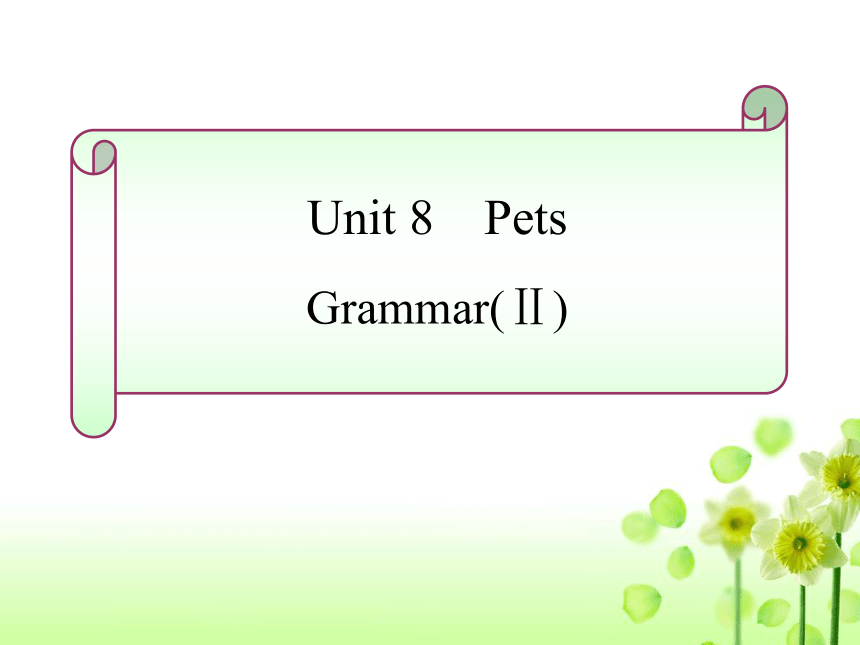
|
|
| 格式 | zip | ||
| 文件大小 | 271.4KB | ||
| 资源类型 | 教案 | ||
| 版本资源 | 牛津译林版 | ||
| 科目 | 英语 | ||
| 更新时间 | 2016-12-20 00:00:00 | ||
图片预览


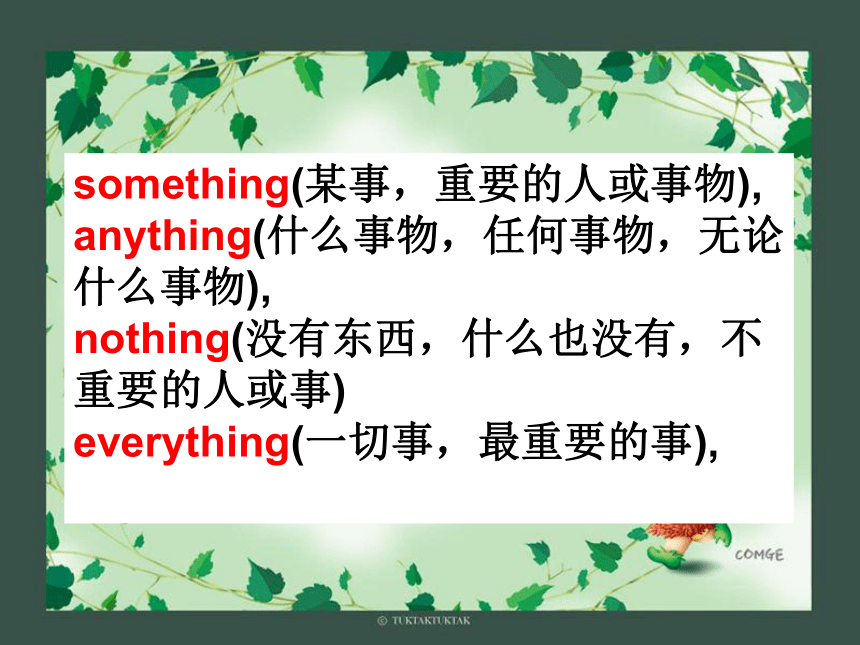
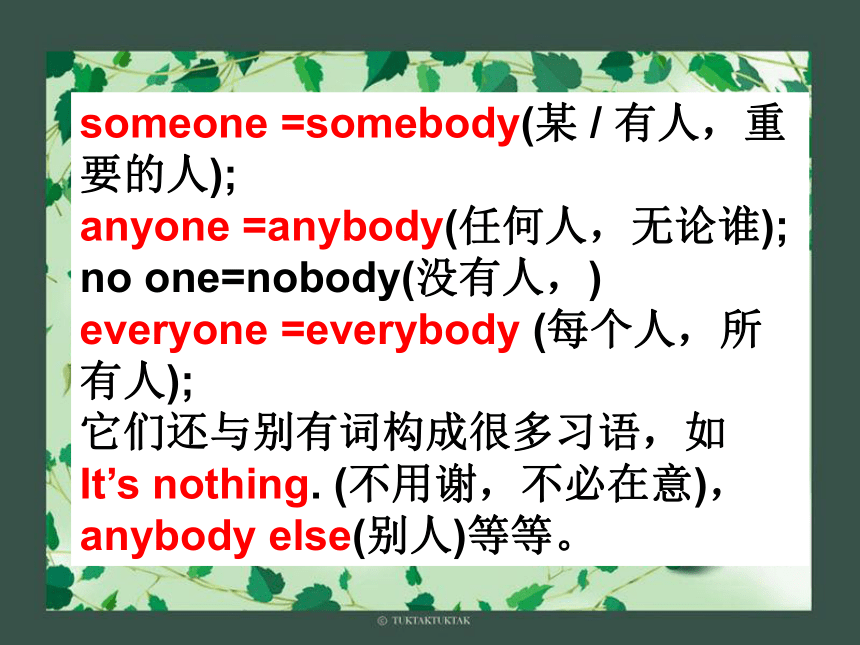
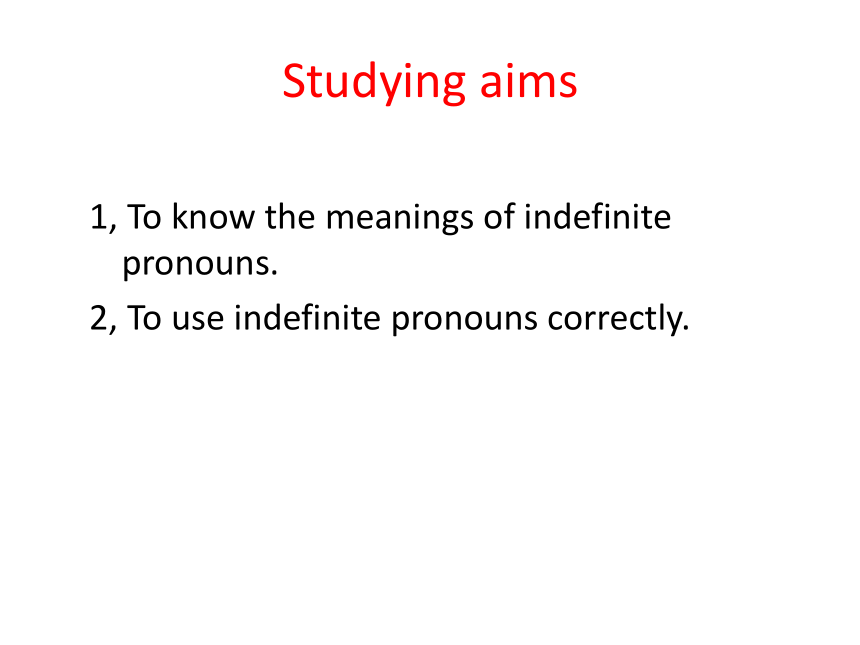
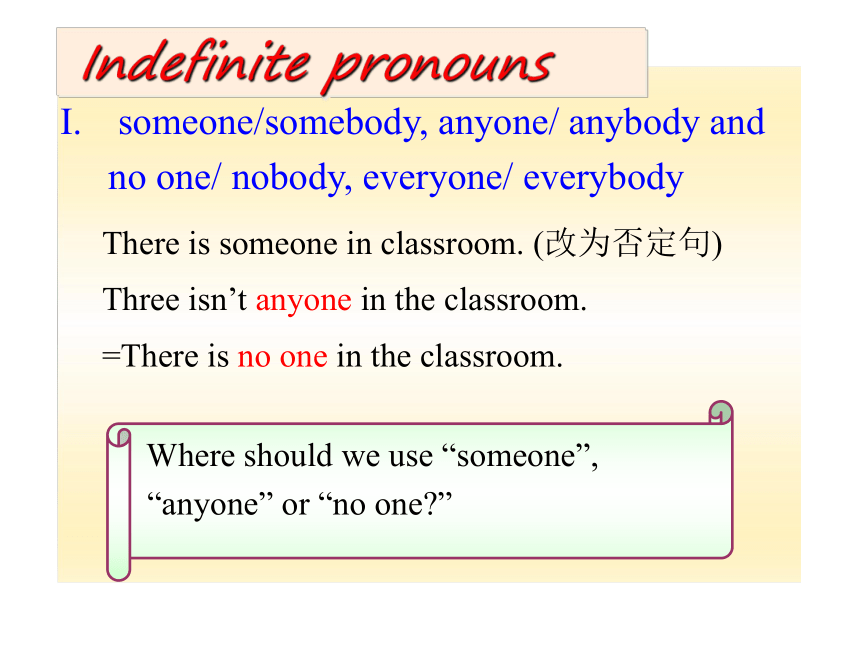
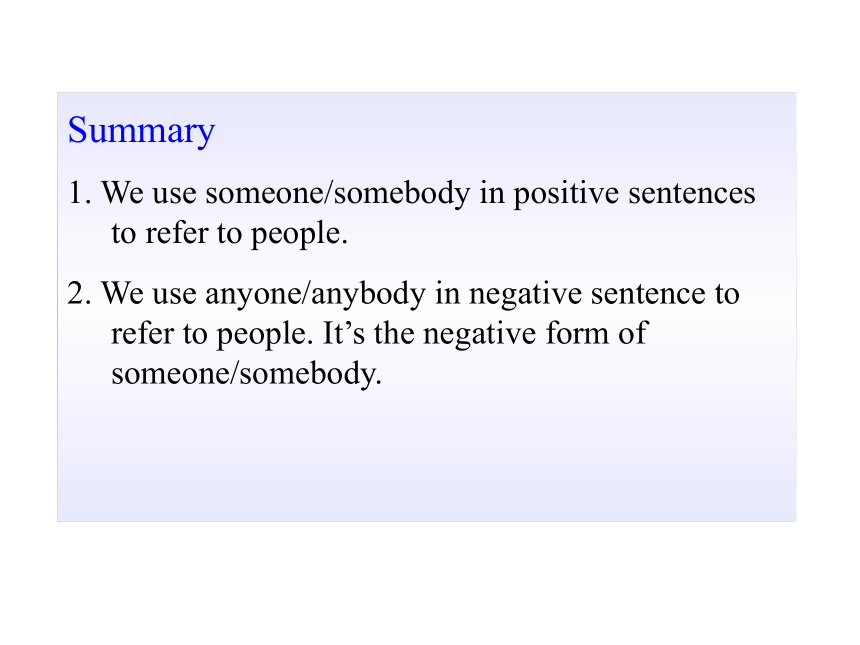
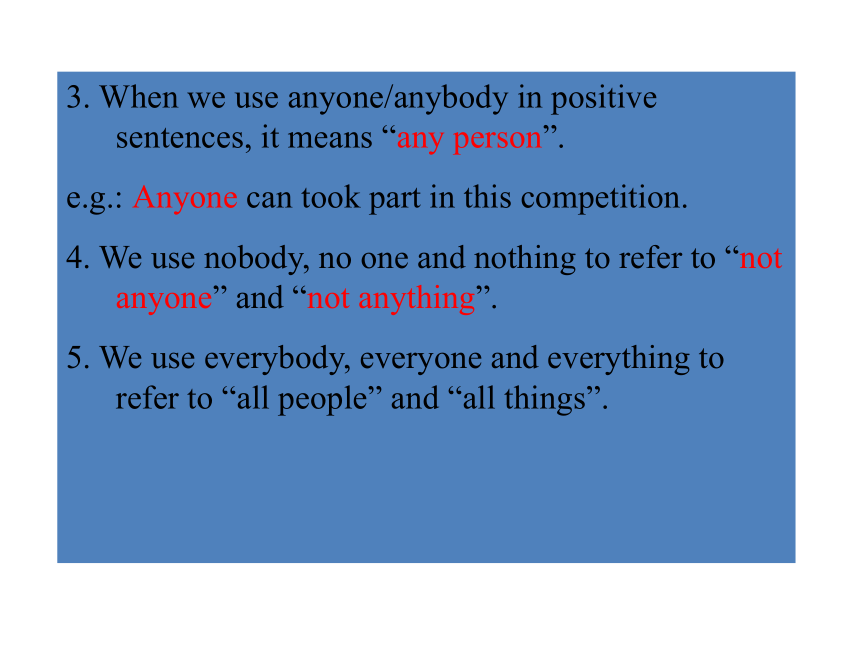
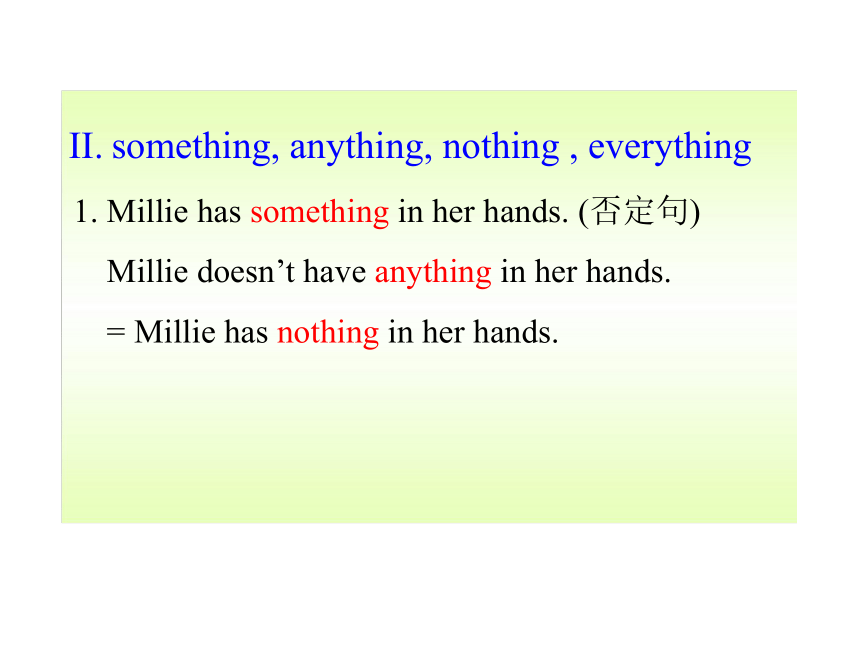
文档简介
课件20张PPT。Unit 8 Pets
Grammar(Ⅱ)复合不定代词something(某事,重要的人或事物),
anything(什么事物,任何事物,无论什么事物),
nothing(没有东西,什么也没有,不重要的人或事)
everything(一切事,最重要的事),
someone =somebody(某 / 有人,重要的人);
anyone =anybody(任何人,无论谁);
no one=nobody(没有人,)
everyone =everybody (每个人,所有人);
它们还与别有词构成很多习语,如
It’s nothing. (不用谢,不必在意),anybody else(别人)等等。 Studying aims1, To know the meanings of indefinite pronouns.
2, To use indefinite pronouns correctly. someone/somebody, anyone/ anybody and no one/ nobody, everyone/ everybodyThere is someone in classroom. (改为否定句)
Three isn’t anyone in the classroom.
=There is no one in the classroom. Where should we use “someone”,
“anyone” or “no one?” Indefinite pronouns1. We use someone/somebody in positive sentences to refer to people.
2. We use anyone/anybody in negative sentence to refer to people. It’s the negative form of someone/somebody.Summary3. When we use anyone/anybody in positive sentences, it means “any person”.
e.g.: Anyone can took part in this competition.
4. We use nobody, no one and nothing to refer to “not anyone” and “not anything”.
5. We use everybody, everyone and everything to refer to “all people” and “all things”.something, anything, nothing , everything1. Millie has something in her hands. (否定句)
Millie doesn’t have anything in her hands.
= Millie has nothing in her hands.
1. Something, anything and nothing are used to refer things.
2. Something is used in positive sentence while anything is used in negative sentence. Summary3. When we are offering something or when we expect the answer to be “yes” we can use “something” in questions.
e.g. Would you like something to eat?
(You want the person say “yes”.)1. —Is ________ here? —No, Bob and Tim have asked for leave. (全国卷) A. anybody?????????????????????????? B. somebody C. everybody???????????????????????? D. nobody C2. I will never know what was on his mind at the time, nor will ________. (江苏卷) A. anyone????????????????????????????????? B. anyone else C. no one?????????????????????????????????? D. no one else BFinish the exercises on Page 98. 1.Prepare by yourselves.
2. Work in groups to read the conversation aloud and understand it.
3. Each group reads a sentence once.
4.Ask some questions about the letter and pick out some language points..
5.Work in groups to solve your problems.
6. Master the useful expressions.堂清知识我们常用不定代词代指某个不特定的人或物。
1,不定代词some-常用于肯定句。疑问句中,如果 希望得到对方肯定回答,也会用some-。
2,不定代词any-常用于否定句或疑问句中。
3,不定代词no-有否定含义,nobody=not anyone, nothing=not anything。
4,不定代词every-可用于各种句式中。
5,不定代词一般都被视作单数。
6,形容词或else常放在不定代词后。Exercises---What a big box! Can I help you?
--- No, thanks. There’s _______ in it. It’s empty.
2. --- Did the doctor live alone in his home?
--- He has two sons and a daughter.
But lives with him. nothing nobody3. --- There’s _________ wrong with my clock. It doesn’t work.
--- Don’t worry. Let me have a look.
4. --- ________ is in the classroom. Where are they?
--- They are all on the playground.
5. --- How easy the Maths exam was!
--- Yes. But I don’t think ________ could pass it. somethingNo one everyone6. --- Listen! ________ is knocking at the door.
7. ---What do you think of Kitty?
--- She is my true friend. She never tells my secrets to _______.
8. --- Helen, what did you talk with Bob?
--- He asked me to tell him _________ I knew. Someone anyonesomethingHomework:Finish the exercises in your exercise book . Thank you!
Grammar(Ⅱ)复合不定代词something(某事,重要的人或事物),
anything(什么事物,任何事物,无论什么事物),
nothing(没有东西,什么也没有,不重要的人或事)
everything(一切事,最重要的事),
someone =somebody(某 / 有人,重要的人);
anyone =anybody(任何人,无论谁);
no one=nobody(没有人,)
everyone =everybody (每个人,所有人);
它们还与别有词构成很多习语,如
It’s nothing. (不用谢,不必在意),anybody else(别人)等等。 Studying aims1, To know the meanings of indefinite pronouns.
2, To use indefinite pronouns correctly. someone/somebody, anyone/ anybody and no one/ nobody, everyone/ everybodyThere is someone in classroom. (改为否定句)
Three isn’t anyone in the classroom.
=There is no one in the classroom. Where should we use “someone”,
“anyone” or “no one?” Indefinite pronouns1. We use someone/somebody in positive sentences to refer to people.
2. We use anyone/anybody in negative sentence to refer to people. It’s the negative form of someone/somebody.Summary3. When we use anyone/anybody in positive sentences, it means “any person”.
e.g.: Anyone can took part in this competition.
4. We use nobody, no one and nothing to refer to “not anyone” and “not anything”.
5. We use everybody, everyone and everything to refer to “all people” and “all things”.something, anything, nothing , everything1. Millie has something in her hands. (否定句)
Millie doesn’t have anything in her hands.
= Millie has nothing in her hands.
1. Something, anything and nothing are used to refer things.
2. Something is used in positive sentence while anything is used in negative sentence. Summary3. When we are offering something or when we expect the answer to be “yes” we can use “something” in questions.
e.g. Would you like something to eat?
(You want the person say “yes”.)1. —Is ________ here? —No, Bob and Tim have asked for leave. (全国卷) A. anybody?????????????????????????? B. somebody C. everybody???????????????????????? D. nobody C2. I will never know what was on his mind at the time, nor will ________. (江苏卷) A. anyone????????????????????????????????? B. anyone else C. no one?????????????????????????????????? D. no one else BFinish the exercises on Page 98. 1.Prepare by yourselves.
2. Work in groups to read the conversation aloud and understand it.
3. Each group reads a sentence once.
4.Ask some questions about the letter and pick out some language points..
5.Work in groups to solve your problems.
6. Master the useful expressions.堂清知识我们常用不定代词代指某个不特定的人或物。
1,不定代词some-常用于肯定句。疑问句中,如果 希望得到对方肯定回答,也会用some-。
2,不定代词any-常用于否定句或疑问句中。
3,不定代词no-有否定含义,nobody=not anyone, nothing=not anything。
4,不定代词every-可用于各种句式中。
5,不定代词一般都被视作单数。
6,形容词或else常放在不定代词后。Exercises---What a big box! Can I help you?
--- No, thanks. There’s _______ in it. It’s empty.
2. --- Did the doctor live alone in his home?
--- He has two sons and a daughter.
But lives with him. nothing nobody3. --- There’s _________ wrong with my clock. It doesn’t work.
--- Don’t worry. Let me have a look.
4. --- ________ is in the classroom. Where are they?
--- They are all on the playground.
5. --- How easy the Maths exam was!
--- Yes. But I don’t think ________ could pass it. somethingNo one everyone6. --- Listen! ________ is knocking at the door.
7. ---What do you think of Kitty?
--- She is my true friend. She never tells my secrets to _______.
8. --- Helen, what did you talk with Bob?
--- He asked me to tell him _________ I knew. Someone anyonesomethingHomework:Finish the exercises in your exercise book . Thank you!
